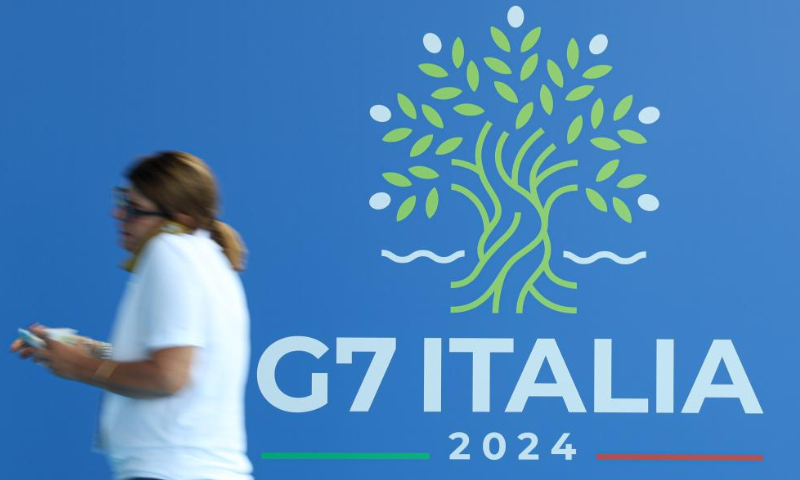
A woman walks past the banner of the Group of Seven (G7) summit at the media center in Bari, Apulia Region, Italy, June 12, 2024. The G7 summit is to be held in the southern Apulia region on June 13-15. Photo: Xinhua
This year's G7 summit has just kicked off, and it is the Western media that are the first to seem deflated, with some even giving off a funeral vibe for the G7. The Politico says that "this week's gathering of G7 leaders in Italy looks more like the last supper than a display of Western power." CNN describes the meeting as G7 leaders gathering in Italy to "escaping political peril at home," and questions how effective the G7, referred to by US President Joe Biden's aides as the "steering committee of the free world," can actually be amid anger and discontent from their own populations. "Does the G7 have any power?" When BBC asks the seemingly calm question, it also displays a sense of helplessness behind it.
Although the US is not the host of this G7 summit, so far all the topics exposed by the media have been framed by the US, which is consistent with the US' diplomatic style internationally. Of course, this does not mean that Europe can only passively nod and accept. According to "sources," the US is preparing to persuade other G7 leaders to agree to use the interest income from the frozen 300 billion euros of the Russian central bank as collateral for a loan to Ukraine, with the EU as the sole guarantor of the loan. This has caused anger within the EU. The differences on issues related to China are even more pronounced, with the US trying hard to warn Chinese banks that "support Russia" and trying to rally Europe to form a united front against the so-called China's overcapacity. However, "some European countries have very intense commercial relations with China" and "are anxious to avoid a trade war."
Washington's calculations are almost smashing into the faces of its allies. Washington aims to maximize its own interests through the above-mentioned issues, while also making other G7 countries voluntarily bear risks and sacrifice their national interests to cooperate with it. It's no wonder that even before the summit convenes, various internal divisions within the G7 have been brought to light through various channels. In general, when the US proposes one thing, Europe pushes back with another. Although in the end, the G7 may still reach a statement emphasizing "unity," the disappointment and anger from Europe toward the US, disregarding these allies' sentiments and interests, are quite evident.
In recent years, the G7 has found a way to increase its visibility and the so-called cohesion by hyping up issues related to China. Last year's joint communiqué mentioned "China" 20 times, almost exhausting all possible topics for sensationalism. The G7 now seems to be trending toward becoming "1+6," being led by the US agenda to contain China.
However, considering the reactions from various sectors in Europe after the EU's tariffs on Chinese goods, whether other G7 countries will disregard their own interests to follow the US agenda still remains a significant question. The G7 is increasingly being turned into a tool for US geopolitical self-interest by Washington, and the "international issues" discussed at the summit are either misaligned with or opposed to those of the international community.
As the "club of wealthy nations," the G7 should have taken on more responsibilities for the world, but it now leaves the world with only disappointment. An international charity group pointed out that with funds equivalent to less than 3 percent of their combined annual military spending, G7 countries could help end world hunger and solve the debt crisis in the Global South. However, not only does the G7 fail to provide any beneficial public goods, but it also continuously exports conflict, confrontation, and risks. If its power has now been halved, its contribution to the world should be considered zero or even negative. The New York Times published an article saying that the G7 faces an "unruly world," which reflects a "Western-centric" perspective. In the view of the international community, the G7, increasingly led toward conservatism and bloc politics by the US, is the side that is truly "out of control."
Last year's G7 summit held in Hiroshima, Japan was jokingly referred to by the media as the "lonely hearts club" annual meeting, and this description remains fitting this year. While international multilateral platforms led by emerging countries are thriving, the G7's small circle is becoming increasingly closed off, with a narrowing path. Today, the G7's ability to curb international conflicts, support international institutions, and enforce international law is weakening day by day. In issues like abusing sanctions and destabilizing the global financial system, the G7 is now creating new risks and threats against global stability. Amid internal conflicts and inconsistent policies, it's already challenging for G7 countries to find their own direction, let alone set "rules" for the world, to believe they are able to "guide the world" and to place themselves above other countries. No wonder even the Western media can't help but sigh.




